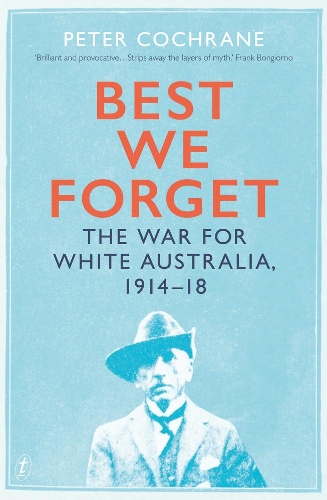
Best We Forget: The War for White Australia 1914-18
(Paperback)
Publishing Details
Best We Forget: The War for White Australia 1914-18
By (Author) Peter Cochrane
Text Publishing
The Text Publishing Company
30th July 2018
Australia
Classifications
Physical Properties
Paperback
272
Width 153mm, Height 234mm
Description
In the half-century preceding the Great War there was a dramatic shift in the mindset of Australias political leaders, from a profound sense of safety in the Empires embrace to a deep anxiety about abandonment by Britain.
Collective memory now recalls a rallying to the cause in 1914, a total identification with British interests and the need to defeat Germany. But there is an underside to this story: the belief that the newly federated nations security, and its race purity, must be bought with blood.
Before the war Commonwealth governments were concerned not with enemies in Europe but with perils in the Pacific. Fearful of an `awakening Asia and worried by opposition to the White Australia policy, they prepared for defence against Japanonly to find themselves fighting for the Empire on the other side of the world. Prime Minister Billy Hughes spoke of this paradox in 1916, urging his countrymen: `I bid you go and fight for white Australia in France.
In this vital and illuminating book, Peter Cochrane examines how the racial preoccupations that shaped Australias preparation for and commitment to the war have been lost to popular memory.
Reviews
`A great read, and an important contribution to making forgotten history more accessiblethe kind of book that will seep into the national consciousness over time. -- Tim Watts, federal MP and co-author of Two Futures
`The words White Australia and Anzac" rarely keep company. In this brilliant and provocative reassessment, Peter Cochrane strips away the layers of myth to show that for Australian leaders World War I was a white racial struggle, with fear of Japan and distrust of Britain, as much as loathing of Germany, at its heart. After Best We Forget, Australias war should never look quite the same again. -- Frank Bongiorno, professor of history at the ANU and author of The Eighties
`Revelatory history at its best. Every Australian politician, journalist and high-school student should read this fluent and compelling story that exhumes an unpalatable truth about our motives for going to war in 1914, and reflect on what it tells us about race fear and the value of history. * Stephen FitzGerald, chairman of China Matters, former diplomat and author of Comrade Ambassador *
`Unsettlingit challenges so powerfully the traditional telling of the Anzac story. * Peter Stanley, professor of history at UNSW Canberra and author of Lost Boys of Anzac *
`Cochrane sweeps away the myth to expose the uncomfortable racial truth at the heart of Anzac. * Paul Daley, award-winning journalist and author of Beersheba *
`Unsettling and revelatoryThe primary purpose of Cochranes fascinating book is to alert readers to the racial dimension of Australias participation in World War I. It also addresses the key historiographical question of what is remembered and what is forgotten, and whyHe has succeeded admirably in this illuminating bookIlluminating. * Australian *
`This careful, detailed accountestablishes that an important motive for our participation [in World War I] was the preservation of white Australia from Asian contamination. * Age *
`Best We Forget is, quite simply, the most important book on Australia and the Great War to appear in the course of the wars centenary...Cochrane has made the original and profound connection between Australian racial fears and its participation in the Great War. This is something thatamazinglyno one else has doneCochranes is a most original and illuminating argument. -- Peter Stanley * Honest History *
Author Bio
Peter Cochranes writing about war includes the award-winning Simpson and the Donkey: The Making of a Legend; the companion volume to the ABC TV series Australians at War; and two studies of wartime photography, The Western Front, 191618 and Tobruk 1941. Cochrane is also the author of Colonial Ambition: Foundations of Australian Democracy, which won the Age Book of the Year award and the Prime Ministers Prize for Australian History, and two works of fiction: the novella Governor Bligh and the Short Man and the recently published novel The Making of Martin Sparrow.
